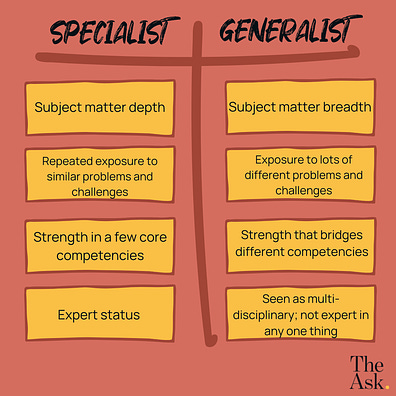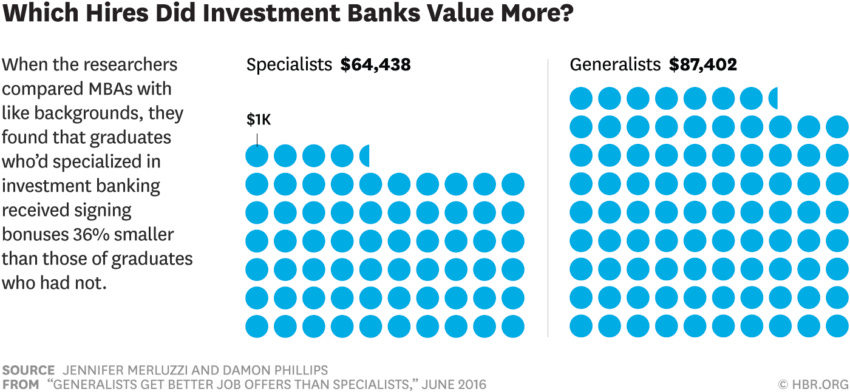Is it better to be a Generalist or Specialist in your Career?
A newsletter for the ambitious seeking clarity, confidence and focus in their work. By Ellen Donnelly, certified Coach and Founder of The Ask®. Is it better to be a Generalist or Specialist in your Career?Exploring the swathes of research and advice on the topic in a bid to get to the bottom of a long-held debate. Part 1 of 2.The age-old debate
If that sounds familiar it is verbatim Liam Neeson from the (not very good film) Taken. You could say that Liam’s character is a career specialist. As a recruiter in my past life, I would have been very excited to hear Liam as my candidate say this during an interview. My clients were paying top dollar to find a highly-distinguished skillset and it was my responsibility to find the people with said skillsets. Specialists typically have an easier time in the job market. They can easily explain what they do, how they do it and point to tangible returns on investment. But does that mean it’s inherently better to specialise? Working in recruitment put me at somewhat of a loss as to what I could personally achieve in my own career path — realising I was becoming a specialist in recruitment and none of the other disciplines, I decided to pack my bags and gain some of those other skills elsewhere. Leaving behind what could have been a very lucrative path as an executive search consultant for top technology startups (a specialist field at the time). I didn’t see this particular specialist path as the one for me. But as I’ve learned in that time, you can apply specialist knowledge, in other contexts, and recreate some of the benefits of both sides. Definitions of what puts you in one camp vs the other are too binary: Most careers oscillate between the two or sit somewhere in between. However for today, I’ll look at each paths objectively as the debate continues to explore them as two opposing paths. Keep reading for the benefits and constraints of each and lessons to take home and apply in your own career. The Case for SpecialisationSpecialists tend to focus on something and go deeper than a non-specialist ever could. Think Phd researchers, quant analysts in hedge funds, neuroscientists working on children’s brain developments… anyone whose work has clear constraints where recognising patterns is of extreme benefit. Such individuals have the opportunity to turn their work into a true craft thanks to their repeated exposure and learning — what Malcom Gladwell has termed the ‘10,000 hours’ rule. With such dedicated learning periods and continued advancement, specialists soon achieve mastery. Focusing on a profession where you can become the best, can make you priceless. Mark H. McCormack wrote a story in his book ‘What They Don’t Teach You at Harvard Business School’ that always struck me:
A lifetime of applied repetition can produce exceptional results. Specialists (like Picasso and Liam Neeson) know their worth. I saw it first hand working in executive search. We described our work searching for the ‘needle in the haystack’ and ‘leaving no stone unturned’ to find the best candidate for the role at hand. I’d spend each day researching, approaching, and then speaking to career specialists who were able to command salaries significantly higher than your average professional ever could. Such people were always headhunted into their next gig, being such a hot commodity, companies would pay to poach them as their own. Assuming that their particular specialism was part of a growing industry their market value would only soar year on year. According to a HBS study, more than a third of employers identified work experience as the most important qualification for evaluating candidates. It’s a somewhat lazy hiring tactic, and I don’t believe always the best, but it continues to pervade in recruitment circles. In other parts of life, incredible opportunities tend to present themselves to those who are widely known as the best. Think of the conference producer seeking speakers for their next event, journalists seeking an expert opinion, documentary filmmakers choosing subjects to study. Most of these opportunities got to specialists. They are well known to be the best in their field, and it is easier to tell a career story and become recognisable when that is the case. In my last two posts I’ve waxed lyrical about the power of focus — doing less, better. It’s true that without being a specialist, you’ll never have the time or opportunity to rack up those 10,000 hours. Depth can provide access to these privileges and opportunities in a way breadth rarely can. Even if you don’t consider yourself a career specialist, you are probably a specialist in another domain of your life. Perhaps an expert on your husband, your friend or your mother… you just know exactly what they will say or do in response to any given situation. Their reflexes have become your own. However one of the arguments against specialism is that of holding too much bias. But could our pre-conceived judgements be placing limits on our work, our partners or our own learning? You can be limited by your experience — expecting and searching for something to happen precisely because you’ve seen it before. This is the core thesis of ‘Range: Why Generalists Triumph in a Specialized World’ in which David Epstein’s favours being a career generalist. He claims many specialists never see the wood for the trees thanks to their narrow focus. The book includes examples of when experts had said that something wasn’t possible how it then happened 15 percent of the time. Times when an expert predicted an event was definitely going to happen, 25 percent of the time it never did. Source. Let’s explore what Epstein, and other proponents of being a career generalist, have to say. The Case for being a GeneralistWho are these ‘Generalists’, exactly? Generalists come armed with a variety of skill sets. Typically, they are more adaptable, lateral thinkers who can do well across multiple functions or subject matters. In her TED Talk that’s racked up over 8m views, Emilie Wapnick tells her story of how during school she noticed she enjoyed all subjects equally. This continued as she grew up; becoming all consumed in a topic for a period of time and getting really good at it, before getting bored about the lack of challenge remaining and moving onto the next. She’d repeat the pattern again. And again. This pattern caused some anxiety about forging a career path around such disparate skills and interests.
The notion of a ‘narrowly focused life’ is highly romanticised and there’s an aspirational idea of having one true calling in life. Those who don’t can feel as though there is something wrong with them, but instead, as Wapnick argues they are ‘multipotentialite’. In Range, David Epstein doesn’t see as reason for shame in variet. He looked at the data — Nobel prize winners were 22 times more likely to have other skills, specifically like performance: amateur acting, dancing, magic etc than their non-Nobel Prize winning peers. Epstein turns much of the conventional ‘10,000 hour rule’ career wisdom on its head by citing examples of many successful people who began their career in a ‘sampling’ period of moving between disciplines —thus amassing a broader range of knowledge and expertise. It was from this place they were able to see novel insights or gain a stronger understanding of their respective fields. He argues that specialist thinking encourages learning from direct experience but severely fails when it comes to learning without experience — basically any kind of hypothetical problem solving, lateral thinking or conceptual reasoning that most careers in the modern world require. The uncertainty in which we live demands that ideas are connected and work across different contexts. Startups especially, can benefit from generalist skills and thinking. By definition, startups are about experimentation and testing. Former Google CEO, Eric Schmidt said in reference to hiring during the early days, “a smart generalist doesn't have bias, so is free to survey the wide range of solutions and gravitate to the best one”. The careers paths of those who pursue life in a ‘rocket-ship’ startup often benefit greatly from a wide range of exposure to different business needs and functions. Angel Investor and Tech operator Helen Min tells of how Dropbox ran the Dropbox Rotation Program when they were a younger business. The programme took new grads from top schools into a two-year generalist business rotation spanning Customer Support, Sales, and Marketing. The idea being many of the brightest minds don’t know what they wanted to do yet and it proved to be a win-win for the employees and Dropbox alike.
When the future is unknown as it tends to be in startup land, a range of skills and aptitudes fares best. You can jump into a new team or department depending on business goals and focus and achieve inter-disciplinary mastery that bridges communication and skills gaps between teams. It’s not just startups that think this way. In 2016 HBR posited that “Generalists get better job offers than specialists” where Investment Banks hired MBA grads, Generalists had higher earning power. If this is all sounding like the news you needed to hear today, you’ll want to check out Generalist World, a community that could be for you. Founded by Milly Tamati it addresses the growing appreciation of generalists in the workforce and sources job opportunities for generalists who ‘don’t fit into a neat box’. In less than 3 months they received 1000s of applications from people who felt seen by what Generalist World stands for and employers are finally taking notice. Generalists are not hampered by their multiplicity it seems. It is in the blending and colliding of insights, skills and experiences that new ideas emerge. It is precisely because generalists have been so underrated for a long time that these communities, research and programmes are needed. Generalists have been underestimated because the path of the specialist is a more well-trodden and simple one. The specialists may experience their own down-falls but in public consciousness they will continue to gain status and awards for their expertise for a long time to come. The call for alternative frameworksThere are better and alternative frameworks and ways of thinking about the generalist v specialist debate — of course everyone exists somewhere on a spectrum. Figuring out a framework that makes sense for your own career path depends on your answers to questions you can start by answering. Questions such as:
Your answers to these questions will lend themselves to a better option for you, uniquely. Which is ‘better’ is subjective. However this is a newsletter for people in entrepreneurial career paths and many of you will resonate with the generalist tendencies. Traditional employment opportunities tend seek candidates who fit neat job descriptions and make it hard to find exciting, challenging roles that span problems and disciplines which is the entrepreneurial preference. It’s precisely why so many ambitious, entrepreneurial folk turn to entrepreneurship or portfolio careers as a necessary alternative to a stifling job. You really do get to wear all the hats in companies of one. You get to wear a lot of hats in early stage, undefined startup environments too. If you resonate with being more of a generalists, do ensure you avoid the following traps at least:
My personal preference is to focus on becoming excellent at a combination of 2-3 valuable skills.
Applying the benefits of depth and expertise from a particular domain or skill, to another one or two, can stand you out from the competition but allow you to sell yourself as the ‘best’ in a given field. I’m developing strengths in coaching and content creation and know there are no jobs that would pay me to do this, I have to do it myself. Other examples include the
You can mix whatever traits and skills you choose — just have a reason for it. How are you thinking about your career path framework? Which shapes or definitions come to mind, if any? Let us know in the comments. In two weeks we will be joined by Sarabeth Berk, TEDx speaker and expert on professional identities who observes there being a third, invisible option in this debate: the hybrid professional. This is an identity many don't realise is available and can be transformative when its understood and explored. I’m excited for you to hear from here. Before you go — know that if you are feeling overwhelmed and in need of a plan for the next phase of your career with bespoke frameworks and guidance — The Ask® coaching can help:
Click here to book your complimentary consultation and make a game plan for your career 2023. Thank you as always for reading!Ellen Donnelly, Founder + Chief Coach, The Ask. Sharing is caring! If you like this post from The Ask Newsletter give it some virtual love! |
Older messages
How to commit and follow through on your career and business goals (continued)
Wednesday, October 19, 2022
Overcoming the focus and execution challenges that sit between you and your biggest goals. Part 2 of a 2-part series.
How to commit and follow through on your career and business goals
Wednesday, October 5, 2022
An essay on finding the necessary conviction to pursue what you SAY you most want in your career and relentlessly execute upon it. Part 1 of a 2 part series.
What makes a career ‘entrepreneurial’?
Wednesday, September 21, 2022
I explain what I mean by coaching people pursuing 'entrepreneurial careers' along with some frameworks for climbing a different career ladder.
How to carve a career path on your own terms
Wednesday, September 7, 2022
When embarking on an unchartered career path you are taking the road less travelled (risk) for a greater sense of fulfilment (reward). Use these 6 steps to get the process right.
What comes first, your personal or company brand?
Wednesday, August 24, 2022
A joint newsletter post ft. Tejaswi Gautam of Future of Work, Future of You on the power of investing in your personal brand to ensure you futureproof your career.
You Might Also Like
$164,449 In 15 Days (His side-income SECRET)
Tuesday, March 18, 2025
5-step action-plan to build a brand-new "side-income" View in browser ClickBank Hi there, This Friday (21st March) a top ClickBank client is running an online Strategy Lab where he'll
Canadian Ecom Seller? A New Course Just for You
Tuesday, March 18, 2025
How independent agencies are staying ahead of the curve
Tuesday, March 18, 2025
Elevating growth amid surging demand for digital media
It's time to bet on emerging platforms
Tuesday, March 18, 2025
Tips to keep your brand adaptable and embrace change ͏ ͏ ͏ ͏ ͏ ͏ ͏ ͏ ͏ ͏ ͏ ͏ ͏ ͏ ͏ ͏ ͏ ͏ ͏ ͏ ͏ ͏ ͏ ͏ ͏ ͏ ͏ ͏ ͏ ͏ ͏ ͏ ͏ ͏ ͏ ͏ ͏ ͏ ͏ ͏ ͏ ͏ ͏ ͏ ͏ ͏ ͏ ͏ ͏ ͏ ͏ ͏ ͏ ͏ ͏ ͏ ͏ ͏ ͏ ͏ ͏ ͏ ͏ ͏ ͏ ͏ ͏ ͏ ͏ ͏ ͏ ͏ ͏ ͏
Elon vs. Sora
Tuesday, March 18, 2025
Google's Veo 2 is in the race too!
The secret to CTAs that convert
Tuesday, March 18, 2025
Your call-to-action (CTA) is the final push that turns visitors into customers. But if it's weak, unclear, or generic, you're leaving money on the table. The best CTAs don't just say “Buy
ET: March 18th 2025
Tuesday, March 18, 2025
Exploding Topics Logo Presented by: Exploding Topics Pro Logo Here's this week's list of rapidly trending topics, insights and analysis. Topic #1 A Pup Above (trends) Chart A Pup Above is a
Newsletters are Dying... But Yours Doesn’t Have To.
Tuesday, March 18, 2025
The 5-Minute Hack to Save Your Dying Newsletter.
31% of All VC Money Last Year Went Into Just 20 Deals
Tuesday, March 18, 2025
Lots of venture capital is going to the same names To view this email as a web page, click here saastr daily newsletter Redpoint: 31% of All VC Money Last Year Went Into Just 20 Deals By Jason Lemkin
Bay Area's AI funding bonanza—or waste?
Tuesday, March 18, 2025
HR tech lawsuit alleges spy scheme; healthtech VC inches toward recovery; Alphabet back in talks for cyberscurity specialist Wiz Read online | Don't want to receive these emails? Manage your





